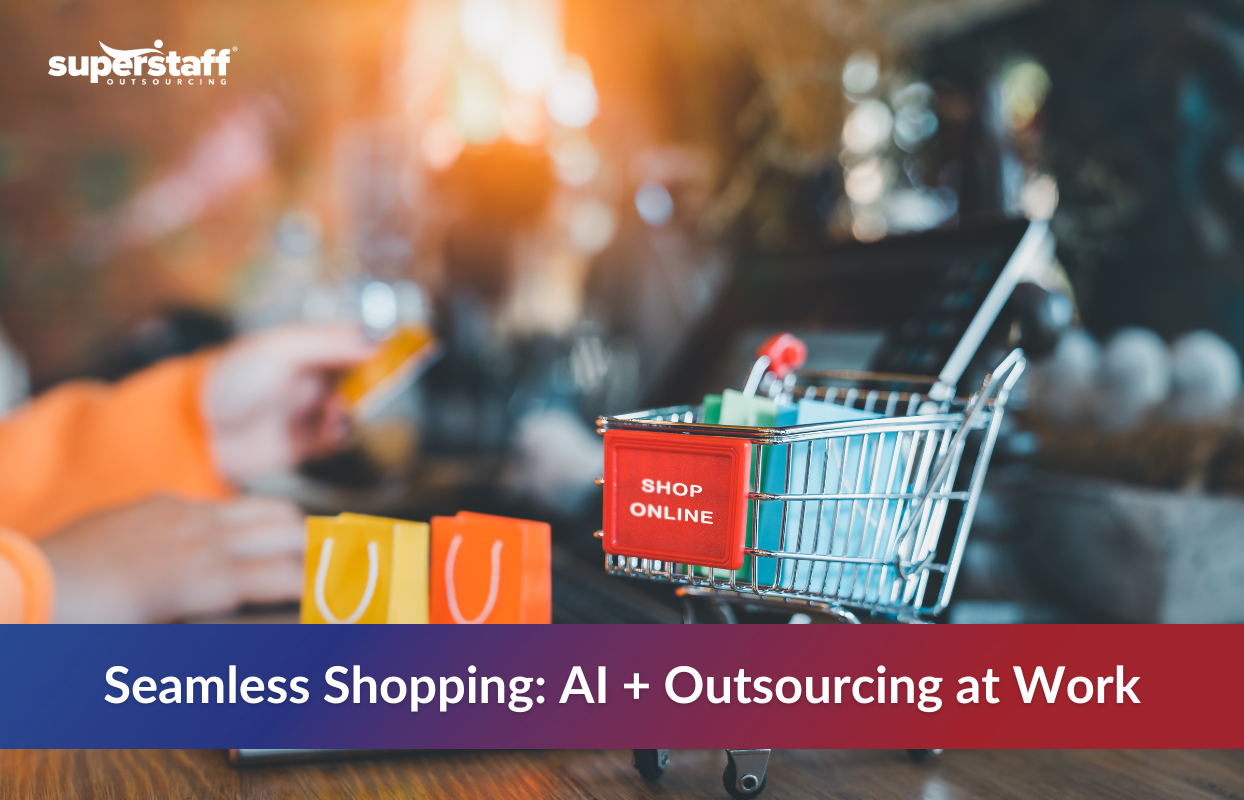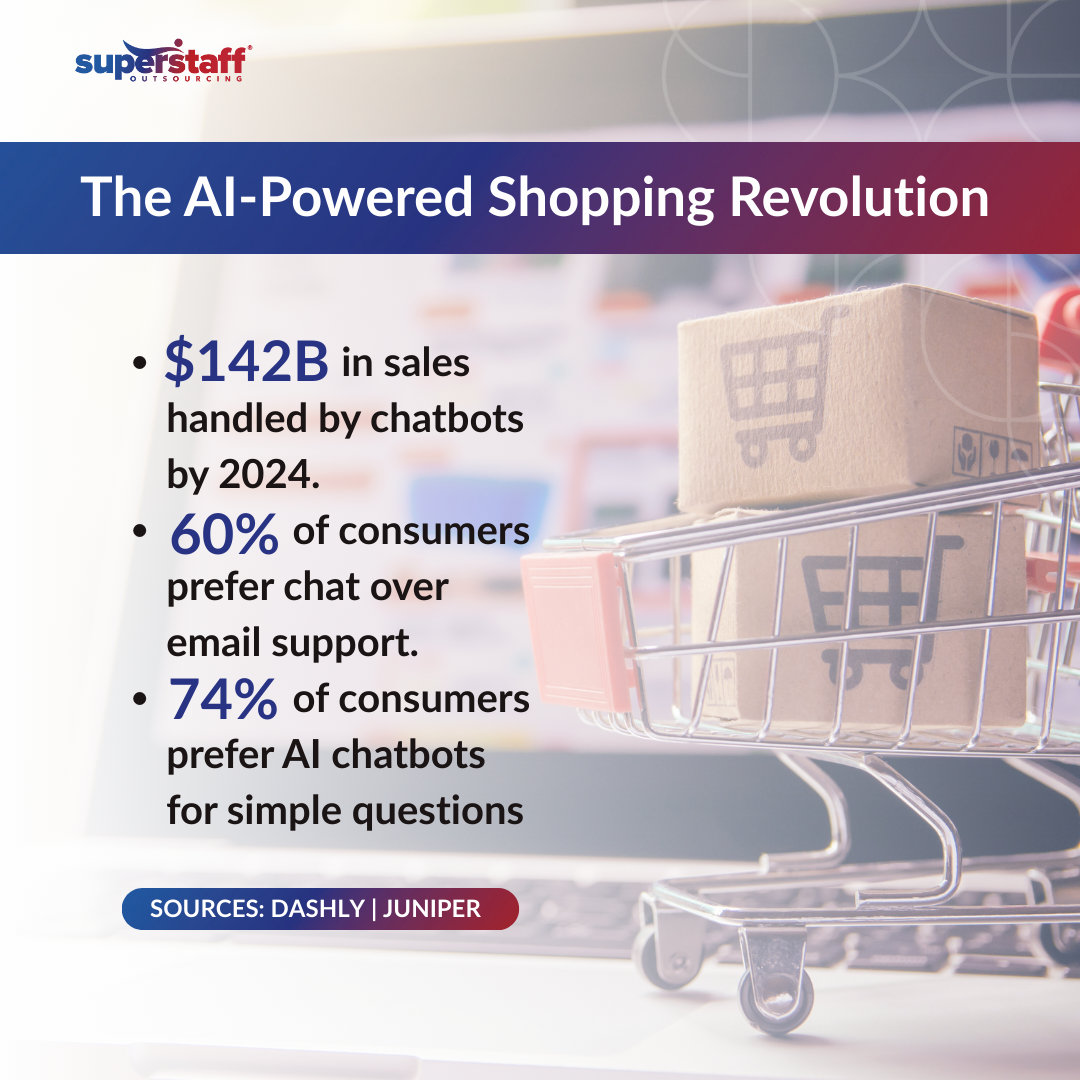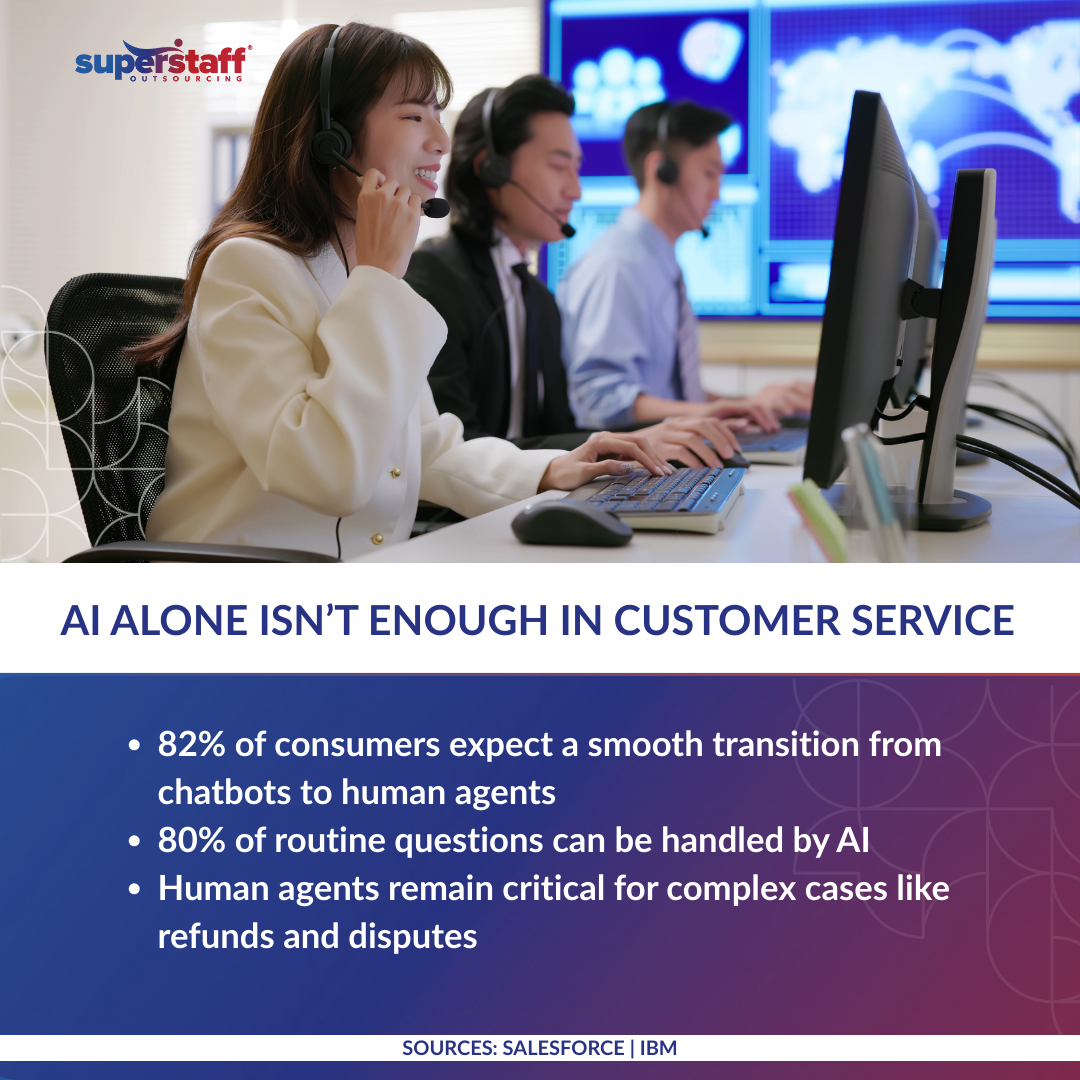
We’ve all been there—frustrated by long wait times, robotic responses, or a chatbot that just doesn’t “get it.” Nothing kills the excitement of shopping faster than a clunky customer service experience. Whether it’s a delayed order, a product question, or an issue at checkout, today’s shoppers expect instant, seamless support.
That’s where conversational commerce comes in. By blending AI-driven voice and chat interfaces with human-powered outsourcing, businesses can offer real-time, personalized interactions—without breaking the bank. This powerful combination isn’t just about answering questions; it’s about guiding customers, resolving issues quickly, and even boosting sales.
In this article, we’ll explore how AI and outsourcing work together to create a smarter, more engaging shopping experience, helping brands connect with customers whenever and however they prefer to interact.
Understanding Conversational Commerce: The Future of Seamless Shopping
Imagine browsing an online store and receiving real-time, personalized recommendations based on your past purchases, preferences, and even current mood. Or picture yourself asking a virtual assistant about product details and receiving an instant, context-aware response—all without lifting a finger.
This is conversational commerce in action—the seamless fusion of AI-driven voice and chat interfaces with human-powered outsourcing to create intuitive, responsive, and efficient shopping experiences. Customers no longer need to navigate complex websites, wait on hold for assistance, or scroll endlessly for answers. Instead, they interact naturally with chatbots and voice assistants, mimicking real conversations with sales associates.
For businesses, conversational commerce is a game-changer. AI-powered chatbots are expected to handle $142 billion in sales by 2024, up from $2.8 billion in 2019. This explosive growth highlights how businesses are increasingly leveraging AI-driven interactions to improve customer experiences and drive revenue.
The AI-Driven Shopping Revolution

AI-powered shopping assistants have completely reshaped the way consumers interact with brands. From personalized product recommendations to automated checkout processes, artificial intelligence streamlines every step of the customer journey, ensuring faster and more efficient transactions.
- 60% of consumers prefer to interact with brands through messaging apps rather than email or phone calls.
- 74% of consumers prefer AI-powered chatbots for answering simple questions.
- Voice commerce is expected to reach $164 billion in transaction value by 2025.
Retail giants like Amazon, Walmart, and Sephora leverage AI-driven chatbots to guide customers through their shopping experience, offering real-time product suggestions, responding to inquiries, and even helping with checkout. Meanwhile, voice assistants like Siri, Google Assistant, and Alexa enable hands-free shopping, allowing users to place orders using simple voice commands.
Why AI Alone Isn’t Enough
While AI chatbots and voice assistants excel at handling routine inquiries, processing orders, and providing instant responses, they struggle in situations that require nuanced understanding, emotional intelligence, or problem-solving skills.

- A customer trying to exchange a damaged product may require personalized assistance to navigate policies and find the best resolution.
- A high-value client seeking customized product recommendations may feel more confident speaking with a knowledgeable human representative rather than a bot.
- A frustrated shopper experiencing a payment issue may need empathetic reassurance—something AI still cannot replicate convincingly.
This is where outsourced customer support teams come in. Instead of relying solely on automation, businesses can blend AI efficiency with human expertise, ensuring customers receive not only fast responses but also meaningful, personalized interactions when needed.
The Ideal Balance: AI + Outsourced Support
By integrating AI with outsourced call center solutions, businesses can:
- Automate first-line support with AI, handling FAQs, order tracking, and basic inquiries.
- Escalate complex issues to human agents who can provide personalized solutions.
- Ensure multilingual, omnichannel support, enhancing accessibility for global customers.
- Create a seamless transition between AI and human interactions, avoiding frustrating dead-ends in customer service.
AI alone can’t deliver the level of engagement and trust that today’s customers expect—but outsourcing human agents ensures a comprehensive, customer-first approach that drives loyalty and sales.
Key Platforms Leading the Conversational Commerce Movement
Conversational commerce thrives across various platforms, enabling businesses to engage with customers wherever they feel most comfortable:
- Facebook Messenger & WhatsApp – Used by over 2.9 billion people worldwide (Statista, source), these apps facilitate real-time conversations between businesses and customers.
- Alexa & Google Assistant – Voice commerce is on the rise, with voice-assisted shopping expected to account for $80 billion in U.S. consumer spending by 2023.
- E-commerce Chatbots (Shopify, Magento, etc.) – AI-powered chatbots integrated into online stores reduce abandoned carts by 30% by re-engaging customers.
- SMS & Mobile Messaging – 90% of SMS messages are read within three minutes, making it a powerful tool for AI-driven customer interactions.
Enhancing Product Discovery and Customer Service
Conversational commerce isn’t just about answering customer questions—it’s about creating a seamless, engaging, and personalized shopping journey.
- AI-driven personalization suggests relevant products based on browsing history, increasing sales by up to 20% (Dashly, source).
- Real-time customer support allows AI to handle FAQs, while human agents tackle high-value, complex interactions.
- Frictionless checkout & order tracking ensures customers can complete purchases and get updates instantly.
- Proactive engagement through AI-powered chatbots can boost cart recovery rates by 35% (Dashly, source).
The Role of AI in Conversational Commerce
AI-driven chatbots and voice assistants are revolutionizing how customers interact with brands, offering instant and personalized support. Today’s consumers expect quick, seamless assistance, and AI makes that possible by automating responses, predicting customer needs, and improving interactions over time.
AI chatbots are particularly effective in handling repetitive inquiries, such as order tracking, FAQs, and return policies. By automating these routine tasks, businesses can free up human agents to focus on more complex customer concerns, ensuring a higher level of service.
Machine learning (ML) plays a crucial role in AI’s evolution. As AI-driven systems interact with customers, they continuously learn and refine their responses, resulting in more accurate, context-aware interactions over time. This means chatbots don’t just follow scripted responses—they adapt to customer behavior, making interactions feel more natural and engaging.
How AI Powers Conversational Commerce
- Natural Language Processing (NLP) for Better Chatbot Understanding
AI chatbots rely on Natural Language Processing (NLP) to analyze and interpret customer inquiries accurately. Advanced NLP algorithms help chatbots understand context, detect sentiment, and even identify slang or industry-specific terms, improving overall customer interactions. 60% of consumers prefer AI chatbots that understand conversational language. - AI-Powered Voice Search and Its Impact on Product Discovery
Voice search is reshaping e-commerce, allowing customers to find and purchase products using spoken commands instead of typing. With 55% of households expected to own smart speakers by 2025. brands that optimize their product listings for voice search gain a competitive advantage in conversational commerce. - Automating Order Tracking, Returns, and FAQs with AI
AI chatbots streamline order tracking, returns, and customer FAQs, reducing the need for human intervention. In fact, 80% of routine customer inquiries can be handled by AI-powered chatbots. This accelerates response times, enhances self-service options, and improves customer satisfaction.
While AI enhances efficiency, outsourced human support is essential for a well-rounded customer experience. AI can assist with straightforward tasks, but human agents remain critical for personalized interactions, complex issue resolution, and customer relationship-building. In the next section, we’ll explore how outsourcing complements AI to create an optimal customer support strategy.
The Role of Outsourcing in Enhancing Conversational Commerce
Outsourced customer service teams complement AI-driven interactions by handling complex issues and providing a human touch. While AI chatbots efficiently manage routine inquiries, they often struggle with nuanced conversations, emotional intelligence, and highly personalized requests. This is where outsourcing becomes invaluable, ensuring that customers receive not just fast responses, but meaningful and empathetic solutions.
AI chatbots rely on pre-programmed responses and machine learning, but they may not fully understand the context behind a customer’s frustration or urgency. For example, a chatbot might process a refund request efficiently but fail to recognize when a VIP customer requires priority service. Outsourced customer service agents bridge this gap by offering critical thinking, cultural understanding, and emotional intelligence—key factors in delivering a premium customer experience.
Outsourcing also enables businesses to provide 24/7 multilingual support without significantly increasing operational costs. According to IBM, AI-powered chatbots can handle 80% of routine customer inquiries, but when customers need to escalate an issue, human support remains irreplaceable.
How Offshore and Nearshore Support Teams Enhance Conversational Commerce
By leveraging offshore and nearshore customer support teams, businesses can ensure cost-effective, scalable, and culturally aligned interactions with customers across different regions.
- Offshore Support Teams
Countries like the Philippines has become leading destinations for outsourcing due to their highly skilled workforce, cost efficiency, and strong English proficiency. The Philippines alone has over 1.4 million BPO employees, making it a global leader in customer service outsourcing. - Nearshore Support Teams
Companies targeting North American markets benefit from nearshore outsourcing in Colombia, where agents provide cultural alignment, real-time support, and native language fluency. This proximity ensures that U.S. businesses can offer seamless customer experiences with minimal language barriers and time zone differences.
The Importance of Escalation from AI Chatbots to Human Agents
A well-designed AI-human escalation strategy ensures that customers receive timely, relevant, and empathetic support when automation reaches its limits. Studies show that 86% of consumers expect chatbots to seamlessly transfer them to a human agent when needed.
Effective escalation includes:
- Reducing frustration – Customers should not have to repeat their issues when transitioning from a bot to a live agent.
- Improving customer satisfaction – Human representatives rebuild trust and strengthen relationships after an automated experience.
- Ensuring first-contact resolution – Outsourced teams increase resolution rates, leading to higher retention and loyalty.
With AI and outsourcing working together, businesses can create seamless omnichannel shopping experiences that blend efficiency, personalization, and high-quality customer care—ultimately driving stronger brand loyalty and revenue growth.
Creating an Omnichannel Conversational Commerce Strategy
A successful conversational commerce strategy integrates AI-driven chat, voice assistants, and outsourced support across multiple platforms, ensuring customers receive a seamless, consistent experience regardless of how they engage with a brand.
Today’s consumers expect businesses to be available whenever and wherever they need assistance—whether through web chat, social media messaging, email, mobile apps, or voice assistants. In fact, 73% of customers use multiple channels during their shopping journey, making an omnichannel approach essential for businesses looking to enhance customer engagement .
AI-driven insights further personalize customer interactions, leveraging data from past conversations, purchase history, and browsing behavior to provide more relevant responses and recommendations. With 80% of consumers more likely to buy from brands offering personalized experiences, businesses that integrate AI with human-assisted support gain a competitive advantage.
Best Practices for Integrating AI Chatbots into Customer Support Workflows
To successfully implement an omnichannel strategy, businesses should:
- Ensure chatbots are integrated across all key platforms, including their website, mobile app, and messaging services like WhatsApp, Facebook Messenger, and Instagram.
- Use AI to automate FAQs, order tracking, and product inquiries while providing a seamless transition to human agents for more complex issues.
- Leverage sentiment analysis to improve AI accuracy, ensuring chatbots recognize frustration or urgency and escalate when necessary.
- Continuously update AI models with real-world customer interactions to refine responses and enhance chatbot efficiency.
Using Customer Data to Improve AI-Driven Recommendations
AI-powered chat and voice assistants are only as effective as the data they rely on. Businesses can optimize their conversational commerce strategy by:
- Analyzing past customer interactions to identify trends and preferences, allowing AI chatbots to make smarter recommendations.
- Integrating AI with CRM and e-commerce platforms to personalize product suggestions based on browsing and purchase history.
- Using predictive analytics to anticipate customer needs and proactively offer solutions before an issue arises.
As businesses scale, AI and outsourcing can drive significant improvements in efficiency and customer satisfaction. A well-executed omnichannel approach ensures frictionless customer interactions across all touchpoints, leading to higher engagement, increased sales, and long-term brand loyalty.
Benefits of AI + Outsourcing for E-Commerce Businesses
Combining AI and outsourced support offers numerous advantages, from cost savings to improved customer experiences. By automating routine inquiries and leveraging human expertise for complex issues, businesses can enhance efficiency, reduce costs, and drive higher customer engagement.
AI-driven chatbots significantly reduce response times, enabling businesses to handle a high volume of customer interactions simultaneously. However, outsourced teams ensure quality, empathy, and problem-solving capabilities that AI alone cannot provide. Research shows that businesses using AI-powered customer service see a 25% increase in engagement and a 20% boost in conversion rates.
Cost-Effectiveness of Outsourcing vs. In-House Customer Support
Outsourcing customer support provides businesses with a scalable and cost-efficient alternative to in-house operations. Key benefits include:
- Lower labor costs – Outsourcing to offshore or nearshore locations can reduce customer support expenses by up to 70% compared to in-house teams.
- 24/7 multilingual support without increasing overhead – AI-powered automation combined with outsourced teams allows businesses to operate around the clock, ensuring global customers receive support in their preferred language.
- Scalability – Businesses can easily adjust support capacity during peak shopping seasons, such as Black Friday and holiday sales, without hiring and training additional in-house staff.
AI-Powered Automation Reduces Support Tickets While Human Agents Handle Escalations
By automating repetitive tasks, AI-powered chatbots help businesses reduce support ticket volume, allowing human agents to focus on higher-value customer interactions.
- AI chatbots can handle up to 80% of routine customer inquiries (e.g., order tracking, FAQs, and returns) (Source).
- Human agents step in for escalated cases, such as disputes, technical support, and complex product inquiries, ensuring customers receive personalized resolutions.
- Blending AI and outsourcing improves response times and first-contact resolution rates, leading to higher customer satisfaction and loyalty.
As AI and outsourcing continue to evolve, businesses must stay ahead of emerging trends in conversational commerce. Investing in smart automation, human expertise, and omnichannel strategies will allow brands to provide seamless, scalable, and customer-centric support—a key factor in long-term e-commerce success.
The Future of Conversational Commerce
AI-powered voice and chat interfaces will continue to shape the future of e-commerce, driving innovation in automation, personalization, and seamless customer experiences. As consumer preferences evolve, businesses must leverage AI advancements and outsourced support to stay competitive in an increasingly digital marketplace.
One of the most significant shifts in conversational commerce is the rise of AI-driven voice shopping. Voice commerce is projected to reach $164 billion in transaction value by 2025, with more consumers relying on Alexa, Google Assistant, and Siri for product discovery and purchases. Smart assistants are becoming virtual shopping companions, helping customers place orders, check availability, and receive personalized recommendations—all through voice commands.
Additionally, AI-human collaboration will continue to enhance customer interactions. While AI streamlines workflows, businesses are investing in hybrid support models where automation handles routine inquiries, and human agents take over complex, relationship-driven conversations. This balance between AI efficiency and human empathy will be critical in improving customer trust and retention.
Hyper-Personalization Through AI-Powered Recommendations
Advancements in machine learning and customer data analytics allow AI to deliver hyper-personalized experiences:
- AI can analyze shopping behavior, preferences, and past purchases to recommend products tailored to each customer.
- Businesses using AI-driven recommendations see a 35% increase in sales due to more relevant product suggestions .
- AI-powered loyalty programs can dynamically adjust promotions based on customer interactions, increasing retention and lifetime value.
AI’s Role in Predictive Customer Support and Automated Problem-Solving
AI is moving beyond reactive customer service and into predictive support, identifying potential issues before they arise:
- AI-powered sentiment analysis can detect frustration or dissatisfaction in customer messages, proactively escalating cases to human agents.
- Predictive analytics help businesses anticipate customer concerns, such as suggesting warranty extensions for frequently serviced products.
- Automated problem-solving through AI-driven self-service portals reduces wait times and enhances the overall customer experience.
As AI and outsourcing continue to evolve, businesses that embrace innovation in conversational commerce will gain a competitive edge.
Transitioning to a Smarter Shopping Experience
Let’s summarize the key takeaways on how AI and outsourcing can transform the e-commerce shopping experience. From enhancing automation and personalization to enabling omnichannel support, businesses that integrate AI-powered solutions with outsourced customer service teams can create a scalable, efficient, and customer-centric operation—the future of seamless digital shopping.
Conversational Commerce: The Future of Shopping
AI-driven conversational commerce, paired with outsourced customer support, creates seamless, efficient, and personalized shopping experiences that meet the evolving demands of today’s consumers. By integrating AI chatbots and voice assistants, businesses can enhance customer engagement, automate repetitive tasks, and provide real-time support. However, AI alone is not enough—outsourced teams offer human expertise, multilingual support, and personalized interactions, ensuring that customers receive the highest quality service.
An omnichannel strategy that blends AI automation with human support is the key to delivering frictionless, scalable, and customer-centric shopping experiences. As AI technology advances, businesses that adopt a hybrid approach—leveraging both AI efficiency and outsourced expertise—will stay ahead of the competition and drive long-term customer loyalty.
Businesses looking to enhance their e-commerce experience should explore AI-powered conversational commerce solutions while leveraging outsourced support to scale customer service effectively. The future of digital commerce belongs to brands that prioritize innovation, efficiency, and human connection—is your business ready to take the next step?






